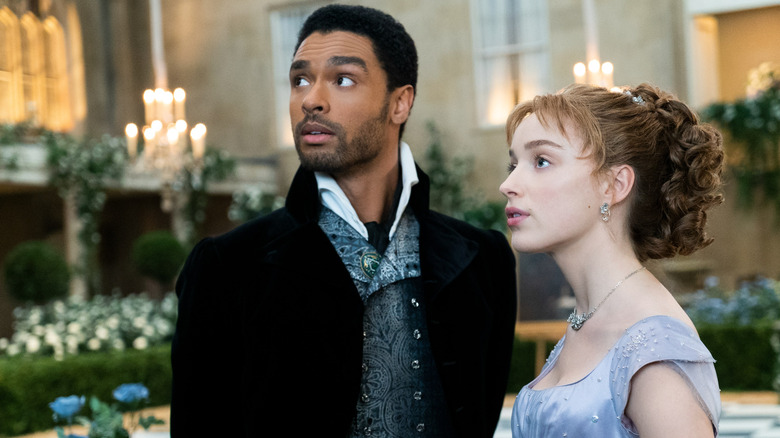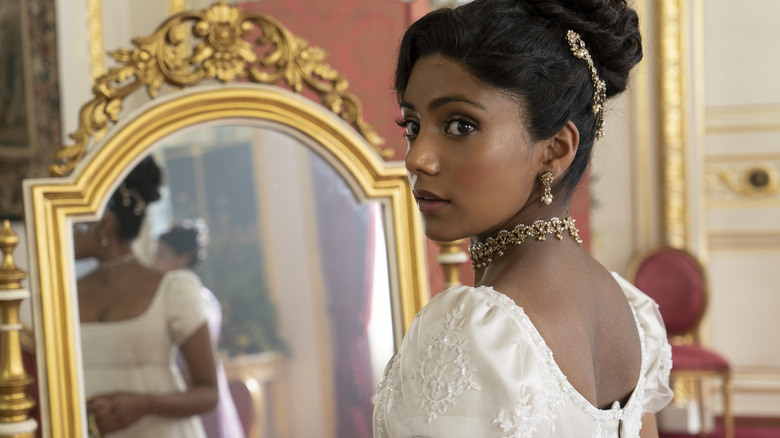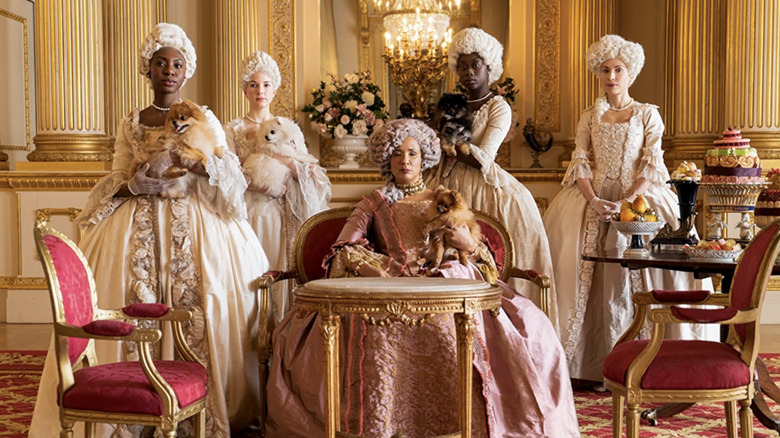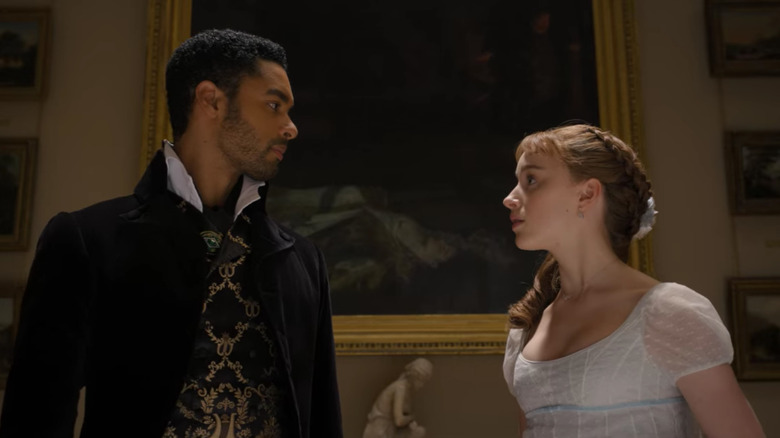Netflix Sues Grammy-Winning Creators Of The Unofficial Bridgerton Musical For Copyright Infringement
We can all agree that a deadly game of red light, green light has lots of theatrical potential, but that doesn't change the fact that somewhere in the world, a very talented musician is slamming the brakes on their plans to write "Squid Game! The Musical." Sorry Broadway — Netflix isn't too keen on musical fan works at the moment, especially those with the potential to make money. Per Reuters, the streamer is now in the process of suing Abigail Barlow and Emily Bear, the Grammy-winning duo behind the internet sensation, "The Unofficial Bridgerton Musical."
On the off chance that you haven't been serenading your neighbors by belting Simon's part of "Burn For You," here's what you need to know. The concept album has been on the rise for well over a year now. After gaining steam on TikTok, the 15-song collection became available to stream and received so much acclaim that eventually, its creators became the youngest artists to ever win a Grammy for Best Musical Theater Album. Through it all, Netflix sat back and let them bask in the glory — even promoting the songs on social media when they got popular with fans on TikTok. But now the streamer is accusing the duo of infringement. So what changed?
The curious case of the Bridgerton musical
Let's start at the beginning. About a month after the Regency-era romance series premiered on Netflix, singer-songwriter Abigail Barlow posted a TikTok posing the question, "What if 'Bridgerton' was a musical?" Then she sang a verse of a song that she wrote and composer Emily Bear arranged. The post got so much attention that the duo teamed up to write more "Bridgerton"-inspired songs. Before long, the project was being heralded by fans. It even caught the attention of series cast members, author Julia Quinn, and Netflix itself.
The streamer went so far as to give them permission to release the full concept album, which debuted online as a freely available homage to the series. And why wouldn't they? The fan-made passion project was great promo for the show ahead of its second season. Alas, it's one thing to get internet famous and win awards for writing songs, and another thing to make money off of your creativity. Barlow and Bear went on to stage a live event at the Kennedy Center in Washington, DC: "The Unofficial Bridgerton Musical Album Live in Concert," which sold out the venue with tickets costing up to $149. Netflix claims to have made "repeated objections" to the stage show and, after being ignored, filed the legal complaint.
"Defendants Abigail Barlow and Emily Bear and their companies ("Barlow and Bear") have taken valuable intellectual property from the Netflix original series 'Bridgerton' to build an international brand for themselves," the 25-page lawsuit states. "Netflix owns the exclusive right to create 'Bridgerton' songs, musicals, or any other derivative works based on 'Bridgerton.' Barlow and Bear cannot take that right — made valuable by others' hard work — for themselves, without permission. Yet that is exactly what they have done."
Netflix's case against Barlow and Bear
With this lawsuit, Netflix is making a bid to halt the duo's plans for future live stagings. In addition the Kennedy Center, Barlow and Bear had plans for a performance in London, along with a line of merchandise based on the album. The potential for a world tour is especially troubling for the streamer, which is all-in on immersive experiences such as "The Queen's Ball: A Bridgerton Experience," a six-city event which would be in direct competition with Bear and Barlow's show.
While Netflix contends that they allowed the duo to move forward with their concept album, the lawsuit argues the album release was never authorized or approved. It says that "In the spirit of supporting what Barlow and Bear represented as two 'Bridgerton' fans' expression of their appreciation for the series," Netflix did not authorize the project but never stood in their way. And then the Kennedy Center performance changed everything. The for-profit aspect of the performances and merchandise looks to be the crux of Netflix's issues. The lawsuit disputes Barlow and Bear's assessment of their own work as "fan fiction," calling it "a blatant infringement of intellectual property rights."
Netflix apparently attempted to compromise before filing the lawsuit. In the lead up to the event, Barlow and Bear's representation were informed that the live performances would constitute willful copyright and trademark infringement unless they negotiated a license — which Netflix was willing to do. Though they don't outline any of the details, Netflix claims to have offered a license that would allow them to proceed with the live performances, continue distributing the album, and make future plans to perform the "Bridgerton"-inspired songs live. The offer was reportedly turned down, and Barlow and Bear have yet to comment on the lawsuit.
Emphasis on the 'Unofficial'
The other issue at hand is the idea that the project misrepresented itself to the audience. The lawsuit claims that using Netflix's "Bridgerton" trademark gives the illusion that the performance and merchandise were approved.
As anyone with a fraction of fandom experience already knows, "The Unofficial Bridgerton Musical" is not the first of its kind. There are a number of fan-made musical parodies based on popular IP. The Team StarKid creation "A Very Potter Musical" made the rounds big time back in the 2010s. Even now, projects like "Stranger Sings! The Parody Musical" continue to pop up. And around the time that the "Bridgerton" musical was gaining steam, so too was a little project called #Ratatouiscal, aka "Ratatouille The TikTok Musical."
In most of these cases, phrases like "A Musical Parody" keep these fan works out of trouble, along with the admission of not owning the characters or trying to make a profit. AVPM was originally titled "Harry Potter: The Musical," but changed the name after Warner Bros. sent a legal warning to the creators. Thanks to its nature as a parody, Team Starkid is allowed to host the musical on their YouTube channel and owns the rights to the songs and script. But since they don't own the rights to the Harry Potter characters, they can't make money off the production.
"Ratatousical" is a special case because last year it made its debut as an online musical theatre experience, starring Broadway stars like André De Shields, Wayne Brady, Adam Lambert and Titus Burgess. It was a crowdsourced and even turned a profit, but all of it went directly to The Actors Fund. Believe it or not, despite having a history of being protective of its properties, Disney gave the team their blessing.
Fans vs. copyright
Another factor to consider is that when these musicals do exist, they're typically performed in smaller venues — off-Broadway or, in AVPM's case, as a college production. Barlow and Bear's show was at the Kennedy Center Concert Hall, with another planned for one of the most historic venues in London, Royal Albert Hall. They weren't filling a tiny room with foldout chairs, so it's no wonder that the potential for profit was turning heads over at Netflix. Fans are already bristling about the lawsuit, with many pointing to the fact that Netflix didn't care about the musical until its creators started earning money. Anticipating the outrage, the lawsuit addresses the timeline as follows:
"In attempting to defend their clients' blatant infringement, Barlow and Bear's attorneys have now taken the position that they somehow do not need a license because Netflix did not file this lawsuit sooner. That is not how copyright law works. Netflix is not required to sue every infringer. Rather, it can make its rights known — which it unambiguously, and repeatedly, did here."
Depending how this plays out, the "Bridgerton" case may have interesting implications for the relationship between copyright owners and fan works. Studios are usually willing to offer a lot of leeway for fan art — even in cases where fans profit by selling merchandise across marketplaces like Etsy and Redbubble. The benefit for them is the organic promotion; Netflix had no reasons to crackdown on the "Bridgerton" musical when it was trending on TikTok just as the show's hype was reaching its heights in 2021. But should the lawsuit go in Netflix's favor — and especially if it doesn't — they'll be much more careful about letting viral fan works get this far in the future. The legal papers can be found here.



